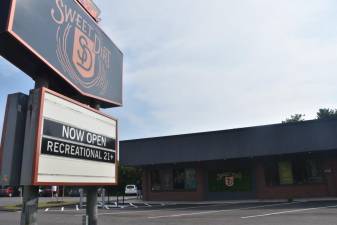Ordinance update could allow cannabis sales in all but residential West Milford zones
When the proposed ordinance is ready, a public hearing will be announced. It will address cannabis cultivation, rules for manufacturing, wholesale distribution and delivery.

A proposed update of the original law controlling cannabis business sales in West Milford was not introduced as expected at the Wednesday night Township of West Milford Council meeting. Councilman Michael Chazukow and Councilwoman Marilyn Lichtenberg requested clarifications on the document before them and the office of Attorney Fred Semrau and Administrator William Senande will see that it is readied for a council vote on its introduction at a future meeting.
When that happens the council will announce a date for a public hearing for citizens to address the council on the proposed ordinance updating one adopted earlier. If passed the law will allow cannabis sales to take place in all zones in West Milford except those zoned as residential.
Where cannabis businesses can be
The proposed ordinance upgrade addresses cannabis cultivation, rules for manufacturing, wholesale distribution and delivery. Included are requirements that facilities in the eligible locations for these activities would have to be at least 500 feet from any parks. The minimum lot area required would be one acre and minimum front yard setback would be 50 feet or the minimum zone standard, whichever is greater. All facilities would be enclosed in heated/air- conditioned buildings, not in greenhouses, hoop houses or outdoors.
Signs and smells
Also required would be air treatment with odor absorbing ventilation and exhaust systems such that odor from inside the facility is not detectable at the property line. Odor from the facility must be monitored annually at township discretion by a licensed contractor chosen by the township.
As proposed, signs would be limited to company address and name, with emergency contact information on one ground sign up to 24 square feet. A state operating license would also be required.
Retail location rules
Retailers would need conditional use approval in all zones. Their facilities would also have to be 500 feet from any parks and 1,000 feet from any schools. The location must be separate and distinct from growing operations.
Cannabis retailers would have to be in heated/air-conditioned permanent buildings. Signs would be limited to the location, with identification and name of the business. Signage would not promote consumption of cannabis products, according to the draft ordinance.
Cannabis delivery service applicants for site plans would need to submit a safety and security plan and emergency services access plan. The retailer would have just one public access point directly adjacent to the right of way or parking area of the building. Access should not be through common entrances with other uses. Hours of operation for cannabis retailers would be limited to 9 a.m.-10 p.m.
Interior security would require cannabis retailers’ interiors to provide a secure location for storage of products, with minimum products in any customer service area. People would not be permitted to congregate outside of a cannabis retailer, loiter or wait in line to access the cannabis retailer. The facility would need a plan in place for excesses of interior capacity, such as assigning numbers to customers, who then wait in their vehicles until called.
No products could be consumed on the site. The facility must have a New Jersey license to operate. Any cannabis facility is subject to compliance with all state laws, regulations and guidelines.
Cannabis delivery
Cannabis delivery would be a conditional use in all township zones, but no conditional use would occur in residential zones. Facilities would be at least 500 feet from parks and 1,000 feet from schools. Delivery would be separate and distinct from growing operations. All Cannabis delivery services would need to be enclosed in heated/air- conditioned permanent buildings, not trailers, outdoors or movable kiosks. Signs would be limited to business location and identification and not allowed to promote consumption of cannabis products.
For site plan approval, cannabis delivery applicants would need to submit a safety and security plan and emergency services access plan. Security requirement for interiors would include a secure product storage location. Customers would not be allowed to pick up cannabis products from a delivery service. No products could be consumed on the site, and a valid New Jersey operation license would be required.
In October 2021, the council asked the Planning Board to consider amendments to the original ordinance passed earlier in the year. Council President Ada Erik, who was council liaison to the board, said the township had been “under the gun” from the state to adopt an ordinance on cannabis if they wanted to permit the businesses to operate, the meeting minutes reported. However, the township attorney had advised the governing body that they could make amendments to the ordinance after it was adopted.
How many cannabis businesses? How much revenue?
Board member Steve Castronova, according to minutes, asked how the township intended to obtain revenue from the licenses, saying he felt that allowing 10 individuals to be licensed for each type of license was excessive. Councilman Warren Gross responded that the township would receive a percentage from taxes collected, resulting in significant municipal revenue.
Erik then noted that the state issues and limits the number of licenses. Castronova pointed out the many township liquor licenses and observed that too many licenses for a product reduces business profits.
Board Attorney Germinario advised that cannabis continue to be a controlled substance, so a site plan continues to be required. Board member Glenn Wenzel noted that the ordinance uses the term “hemp products,” and hemp farming was not in the legislation.
Germinario advised the board to determine whether the ordinance is consistent with the West Milford Master Plan, saying it was their prerogative to accept the recommendation of the Board Planner.
Board Member Linda Connolly inquired how licenses are issued by the state. Erik responded that the process was still unknown but that the township has the right of refusal and cannabis licenses cannot be sold or transferred. Chairman Chris Garcia said that cultivation and processing must be in an indoor facility, with many regulations. He questioned where a facility would be acceptable with the Highlands restrictions in place.

